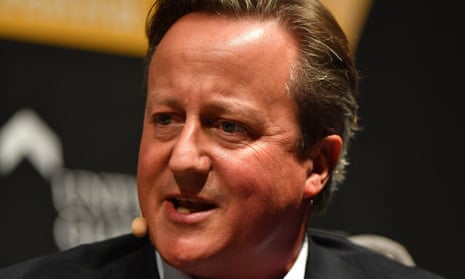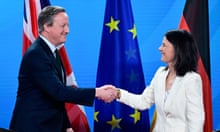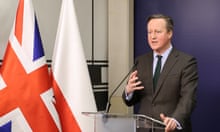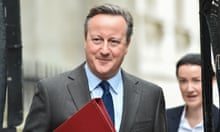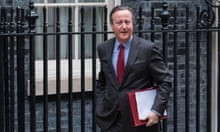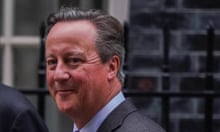New questions are being raised over David Cameron’s attempts to lobby government on behalf of doomed lender Greensill Capital, after he reportedly contacted the chancellor’s private phone in hopes of securing special access to hundreds of thousands of pounds of emergency Covid loans.
The Sunday Times reported that the former prime minister, who was an adviser and shareholder in Greensill, sent multiple texts to Rishi Sunak in April 2020, in hopes of gaining access to cheap, 100% government-backed loans through the Covid corporate financing facility (CCFF).
Greensill hoped to use the money to lend cash to its clients, which included Liberty Steel’s owner, GFG Alliance. However, granting Greensill access to the CCFF would have meant bending the rules, since lenders are not meant to borrow money through that programme.
Most of Cameron’s texts to Sunak went unanswered, the newspaper said. The chancellor reportedly backed officials who said Greensill did not qualify for the scheme and referred Cameron to senior officials at the Treasury – including the permanent secretaries Tom Scholar and Charles Roxburgh – who were later contacted by the former prime minister.
The Guardian put the allegations to Cameron’s office, which did not reply.
Cameron’s attempts to sway officials were part of wider lobbying efforts by Greensill, which, according to public records, also held 10 virtual meetings with Scholar and Roxburgh between March and June last year.
Greensill, which lent money to large businesses so that they could pay their suppliers, went into administration this month after insurers refused to renew contracts covering its loans.
The Treasury would not comment on whether Cameron had contacted Sunak but a spokesperson said: “Treasury officials regularly meet with stakeholders to discuss our economic response to Covid.
“The meetings in question were primarily about broadening the scope of CCFF to enable access for providers of supply chain finance, which – following a call for evidence and discussions with several other firms within the sector – we decided against and informed the businesses concerned.”
Labour has intensified its calls for an investigation into the former prime minister’s alleged attempts to use his influence in Whitehall. The shadow chancellor, Anneliese Dodds, said: “Rishi Sunak already had questions to answer as to why Greensill was given so much more access to the Treasury than other Covid lenders.
“The suggestion that David Cameron was also contacting the Chancellor directly to further Greensill’s commercial interests raises even bigger concerns.
“This is public money, and the processes involved in decision-making should be fully transparent and beyond reproach. We need a full and thorough investigation into what’s happened here.”
Cameron’s lobbying efforts also extended to Sydney. Sources told the Guardian that in 2018, the ex-prime minister met an Australian insurance company employee, who was later dismissed over his alleged involvement in overextending contracts that underpinned Greensill’s controversial lending model.
Cameron has not responded to requests for comment about the purpose of that visit.
Although Greensill was headquartered in Australia, its largest offices were in the UK, where it employed nearly 600 staff. Administrators confirmed that 440 UK staff were let go last week.
Meanwhile, Liberty, the UK’s third-largest steelmaker, has been forced to pause production at some of its UK plants to conserve cash as a result of Greensill’s collapse. Its parent company, GFG Alliance, employs about 5,000 people in the UK and was one of Greensill’s largest borrowers.
The UK government has reportedly drawn up contingency plans to keep Liberty running with public cash until it can secure a buyer, if its parent company fails to find new funding to replace Greensill loans, according to the Financial Times.
